Mono-cultural Societies Versus Multicultural Societies Essay
VerifiedAdded on 2023/06/04
|11
|2608
|448
Essay
AI Summary
This essay critically examines the ongoing debate regarding whether mono-cultural or multicultural societies are more peaceful and beneficial. The author argues in favor of multicultural societies, highlighting their advantages in promoting understanding, tolerance, and global citizenship. The essay begins by defining the core concepts of culture and multiculturalism, contrasting the characteristics of mono-cultural and multicultural societies. It then explores various perspectives, including the potential for increased crime and insecurity in multicultural settings, particularly in the context of immigration. The essay counters these concerns by emphasizing the narrow-mindedness and lack of tolerance often found in mono-cultural societies. It discusses how multiculturalism fosters personal and individual growth, stimulates innovation, and encourages a celebration of diversity. The essay addresses counterarguments, such as the potential for anger, discomfort, and challenges to social cohesion within multicultural societies. The author uses examples and academic references to support the argument that multiculturalism, despite its challenges, ultimately leads to a more tolerant, democratic, and progressive society. The conclusion reinforces the idea that multicultural societies offer the best path toward global citizenship and a more peaceful world, while mono-cultural societies pose greater risks of isolation and conflict.
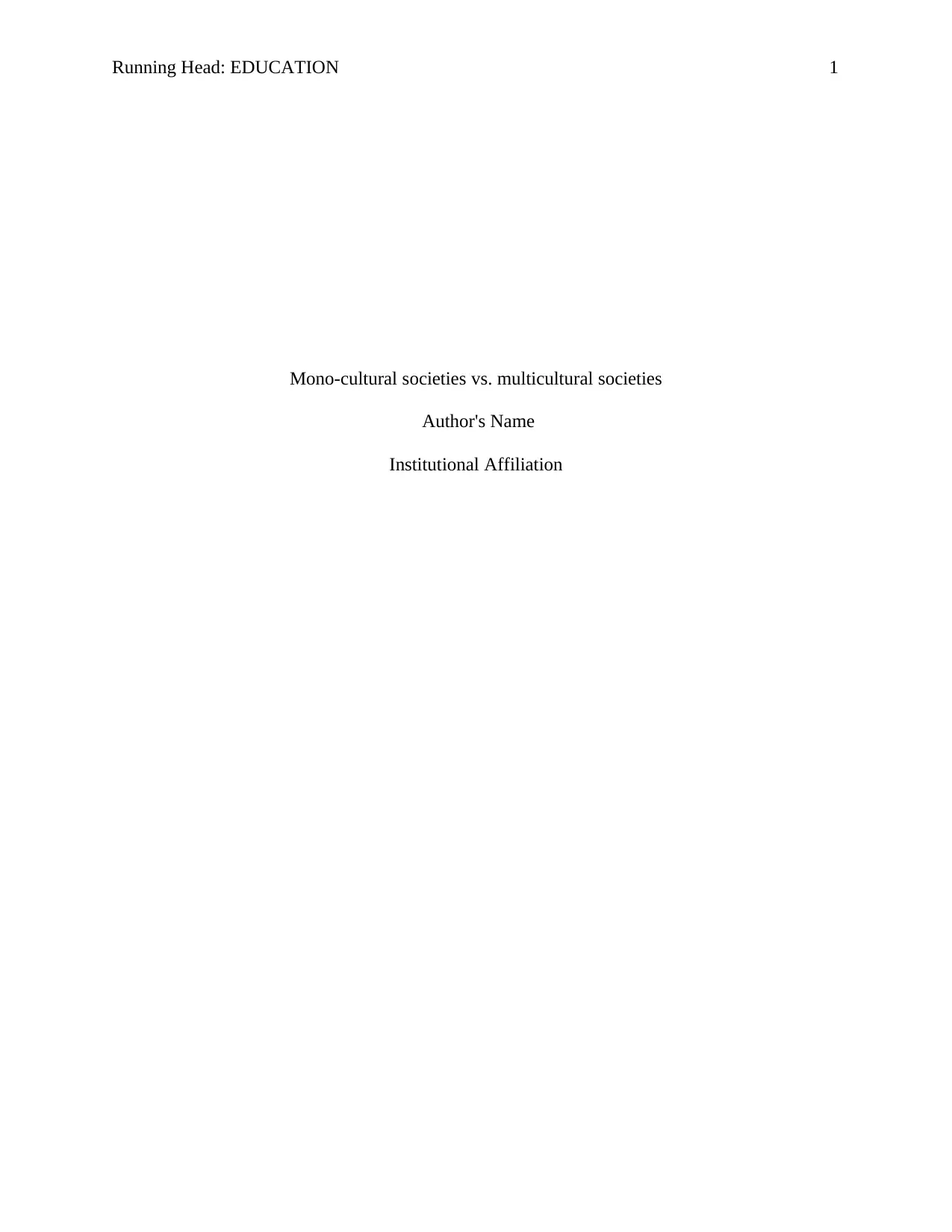
Running Head: EDUCATION 1
Mono-cultural societies vs. multicultural societies
Author's Name
Institutional Affiliation
Mono-cultural societies vs. multicultural societies
Author's Name
Institutional Affiliation
Paraphrase This Document
Need a fresh take? Get an instant paraphrase of this document with our AI Paraphraser
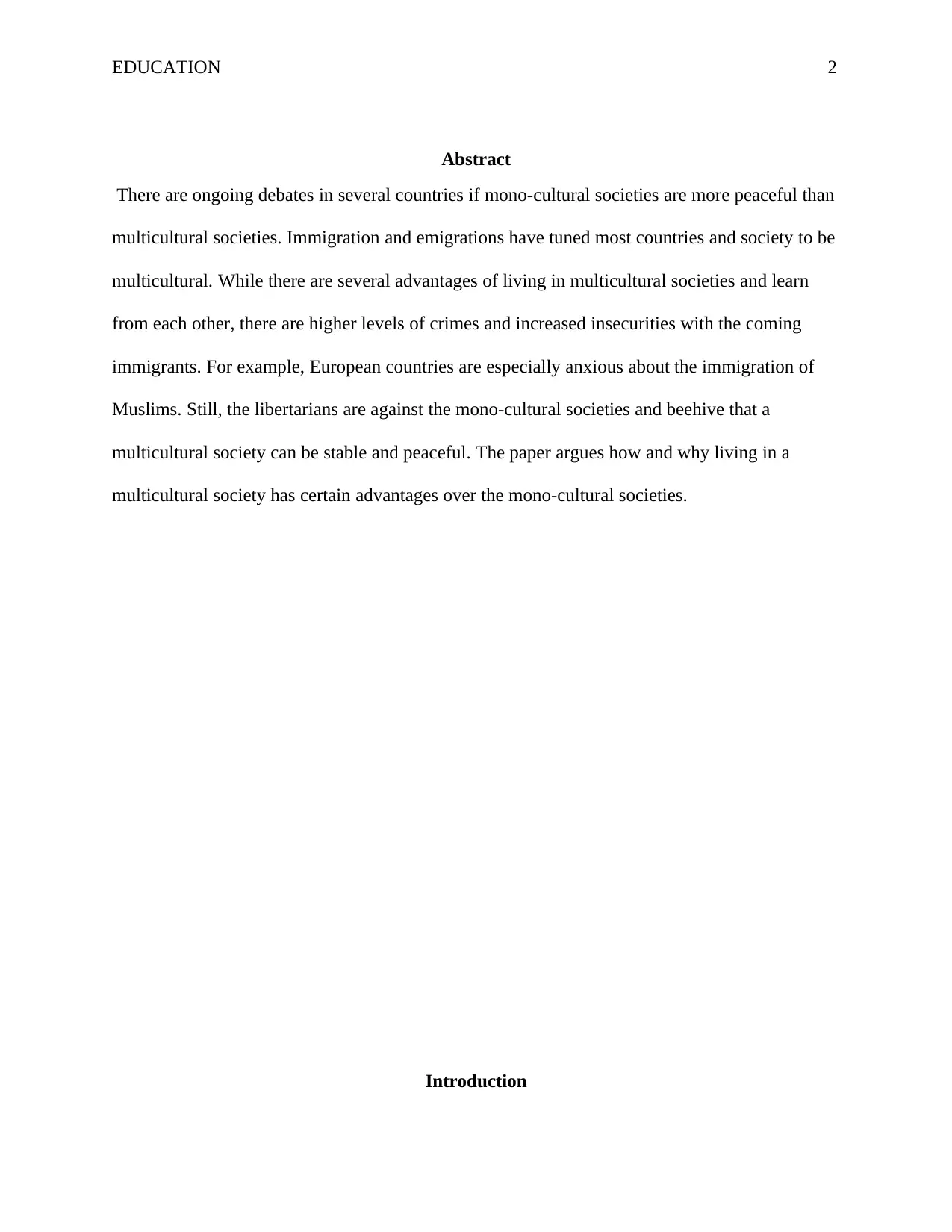
EDUCATION 2
Abstract
There are ongoing debates in several countries if mono-cultural societies are more peaceful than
multicultural societies. Immigration and emigrations have tuned most countries and society to be
multicultural. While there are several advantages of living in multicultural societies and learn
from each other, there are higher levels of crimes and increased insecurities with the coming
immigrants. For example, European countries are especially anxious about the immigration of
Muslims. Still, the libertarians are against the mono-cultural societies and beehive that a
multicultural society can be stable and peaceful. The paper argues how and why living in a
multicultural society has certain advantages over the mono-cultural societies.
Introduction
Abstract
There are ongoing debates in several countries if mono-cultural societies are more peaceful than
multicultural societies. Immigration and emigrations have tuned most countries and society to be
multicultural. While there are several advantages of living in multicultural societies and learn
from each other, there are higher levels of crimes and increased insecurities with the coming
immigrants. For example, European countries are especially anxious about the immigration of
Muslims. Still, the libertarians are against the mono-cultural societies and beehive that a
multicultural society can be stable and peaceful. The paper argues how and why living in a
multicultural society has certain advantages over the mono-cultural societies.
Introduction
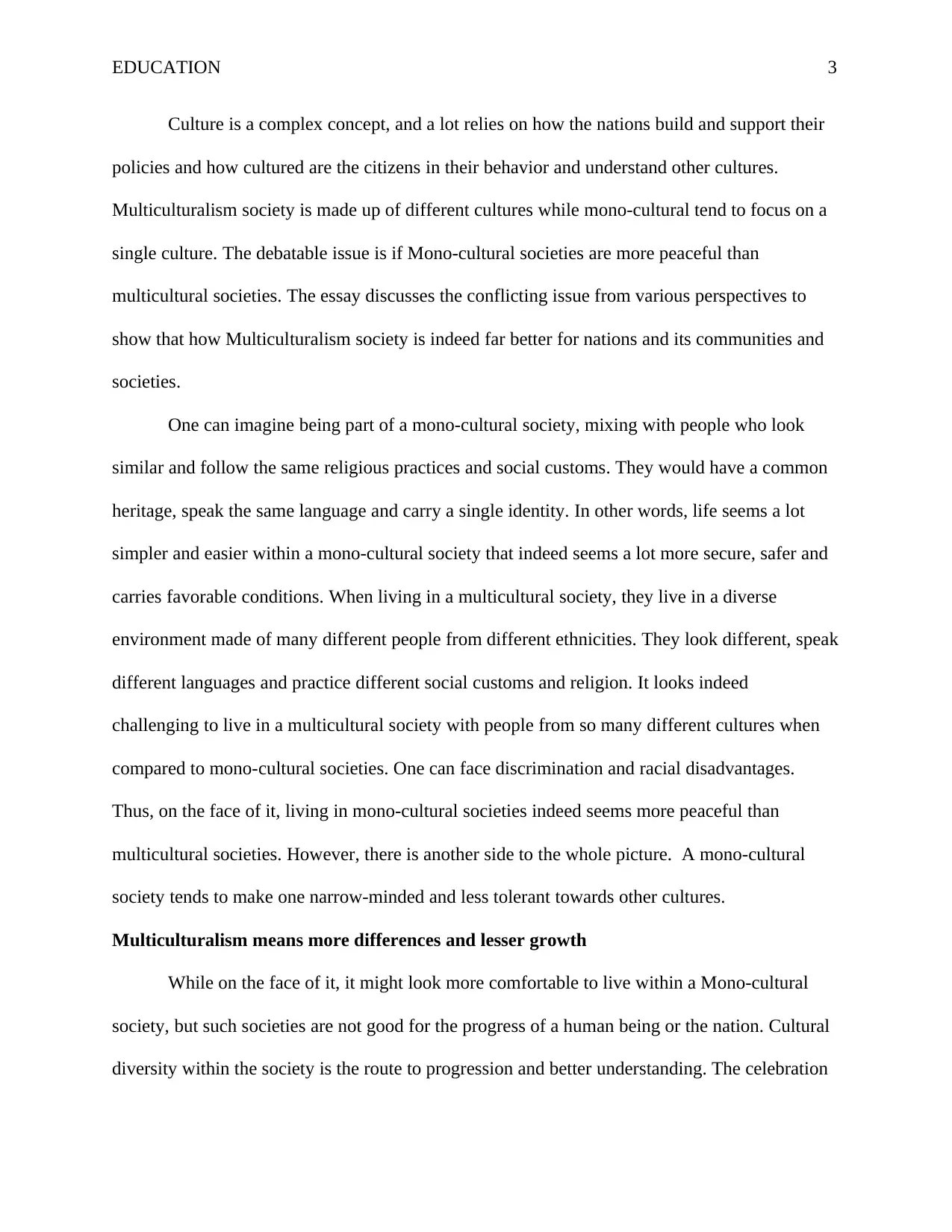
EDUCATION 3
Culture is a complex concept, and a lot relies on how the nations build and support their
policies and how cultured are the citizens in their behavior and understand other cultures.
Multiculturalism society is made up of different cultures while mono-cultural tend to focus on a
single culture. The debatable issue is if Mono-cultural societies are more peaceful than
multicultural societies. The essay discusses the conflicting issue from various perspectives to
show that how Multiculturalism society is indeed far better for nations and its communities and
societies.
One can imagine being part of a mono-cultural society, mixing with people who look
similar and follow the same religious practices and social customs. They would have a common
heritage, speak the same language and carry a single identity. In other words, life seems a lot
simpler and easier within a mono-cultural society that indeed seems a lot more secure, safer and
carries favorable conditions. When living in a multicultural society, they live in a diverse
environment made of many different people from different ethnicities. They look different, speak
different languages and practice different social customs and religion. It looks indeed
challenging to live in a multicultural society with people from so many different cultures when
compared to mono-cultural societies. One can face discrimination and racial disadvantages.
Thus, on the face of it, living in mono-cultural societies indeed seems more peaceful than
multicultural societies. However, there is another side to the whole picture. A mono-cultural
society tends to make one narrow-minded and less tolerant towards other cultures.
Multiculturalism means more differences and lesser growth
While on the face of it, it might look more comfortable to live within a Mono-cultural
society, but such societies are not good for the progress of a human being or the nation. Cultural
diversity within the society is the route to progression and better understanding. The celebration
Culture is a complex concept, and a lot relies on how the nations build and support their
policies and how cultured are the citizens in their behavior and understand other cultures.
Multiculturalism society is made up of different cultures while mono-cultural tend to focus on a
single culture. The debatable issue is if Mono-cultural societies are more peaceful than
multicultural societies. The essay discusses the conflicting issue from various perspectives to
show that how Multiculturalism society is indeed far better for nations and its communities and
societies.
One can imagine being part of a mono-cultural society, mixing with people who look
similar and follow the same religious practices and social customs. They would have a common
heritage, speak the same language and carry a single identity. In other words, life seems a lot
simpler and easier within a mono-cultural society that indeed seems a lot more secure, safer and
carries favorable conditions. When living in a multicultural society, they live in a diverse
environment made of many different people from different ethnicities. They look different, speak
different languages and practice different social customs and religion. It looks indeed
challenging to live in a multicultural society with people from so many different cultures when
compared to mono-cultural societies. One can face discrimination and racial disadvantages.
Thus, on the face of it, living in mono-cultural societies indeed seems more peaceful than
multicultural societies. However, there is another side to the whole picture. A mono-cultural
society tends to make one narrow-minded and less tolerant towards other cultures.
Multiculturalism means more differences and lesser growth
While on the face of it, it might look more comfortable to live within a Mono-cultural
society, but such societies are not good for the progress of a human being or the nation. Cultural
diversity within the society is the route to progression and better understanding. The celebration
⊘ This is a preview!⊘
Do you want full access?
Subscribe today to unlock all pages.

Trusted by 1+ million students worldwide
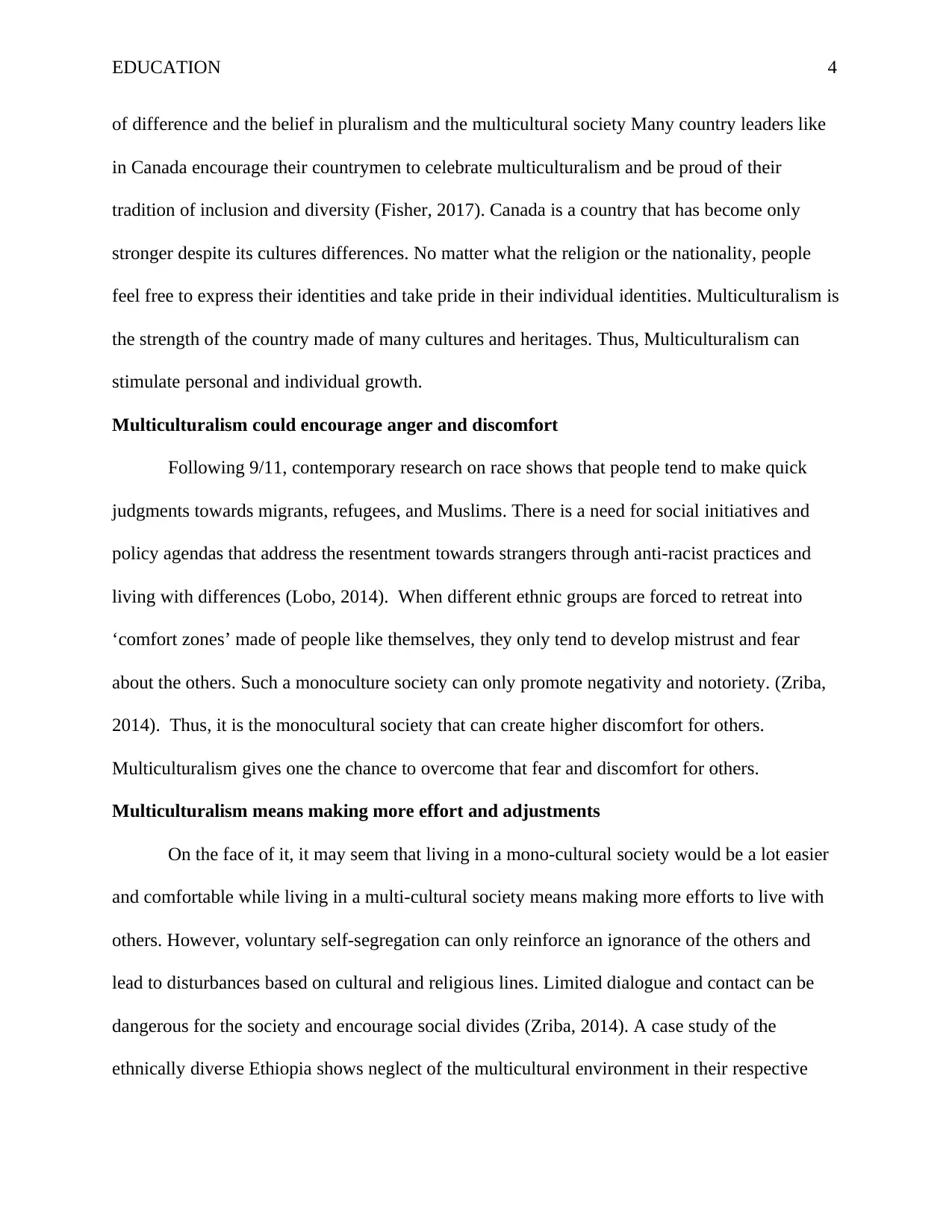
EDUCATION 4
of difference and the belief in pluralism and the multicultural society Many country leaders like
in Canada encourage their countrymen to celebrate multiculturalism and be proud of their
tradition of inclusion and diversity (Fisher, 2017). Canada is a country that has become only
stronger despite its cultures differences. No matter what the religion or the nationality, people
feel free to express their identities and take pride in their individual identities. Multiculturalism is
the strength of the country made of many cultures and heritages. Thus, Multiculturalism can
stimulate personal and individual growth.
Multiculturalism could encourage anger and discomfort
Following 9/11, contemporary research on race shows that people tend to make quick
judgments towards migrants, refugees, and Muslims. There is a need for social initiatives and
policy agendas that address the resentment towards strangers through anti-racist practices and
living with differences (Lobo, 2014). When different ethnic groups are forced to retreat into
‘comfort zones’ made of people like themselves, they only tend to develop mistrust and fear
about the others. Such a monoculture society can only promote negativity and notoriety. (Zriba,
2014). Thus, it is the monocultural society that can create higher discomfort for others.
Multiculturalism gives one the chance to overcome that fear and discomfort for others.
Multiculturalism means making more effort and adjustments
On the face of it, it may seem that living in a mono-cultural society would be a lot easier
and comfortable while living in a multi-cultural society means making more efforts to live with
others. However, voluntary self-segregation can only reinforce an ignorance of the others and
lead to disturbances based on cultural and religious lines. Limited dialogue and contact can be
dangerous for the society and encourage social divides (Zriba, 2014). A case study of the
ethnically diverse Ethiopia shows neglect of the multicultural environment in their respective
of difference and the belief in pluralism and the multicultural society Many country leaders like
in Canada encourage their countrymen to celebrate multiculturalism and be proud of their
tradition of inclusion and diversity (Fisher, 2017). Canada is a country that has become only
stronger despite its cultures differences. No matter what the religion or the nationality, people
feel free to express their identities and take pride in their individual identities. Multiculturalism is
the strength of the country made of many cultures and heritages. Thus, Multiculturalism can
stimulate personal and individual growth.
Multiculturalism could encourage anger and discomfort
Following 9/11, contemporary research on race shows that people tend to make quick
judgments towards migrants, refugees, and Muslims. There is a need for social initiatives and
policy agendas that address the resentment towards strangers through anti-racist practices and
living with differences (Lobo, 2014). When different ethnic groups are forced to retreat into
‘comfort zones’ made of people like themselves, they only tend to develop mistrust and fear
about the others. Such a monoculture society can only promote negativity and notoriety. (Zriba,
2014). Thus, it is the monocultural society that can create higher discomfort for others.
Multiculturalism gives one the chance to overcome that fear and discomfort for others.
Multiculturalism means making more effort and adjustments
On the face of it, it may seem that living in a mono-cultural society would be a lot easier
and comfortable while living in a multi-cultural society means making more efforts to live with
others. However, voluntary self-segregation can only reinforce an ignorance of the others and
lead to disturbances based on cultural and religious lines. Limited dialogue and contact can be
dangerous for the society and encourage social divides (Zriba, 2014). A case study of the
ethnically diverse Ethiopia shows neglect of the multicultural environment in their respective
Paraphrase This Document
Need a fresh take? Get an instant paraphrase of this document with our AI Paraphraser
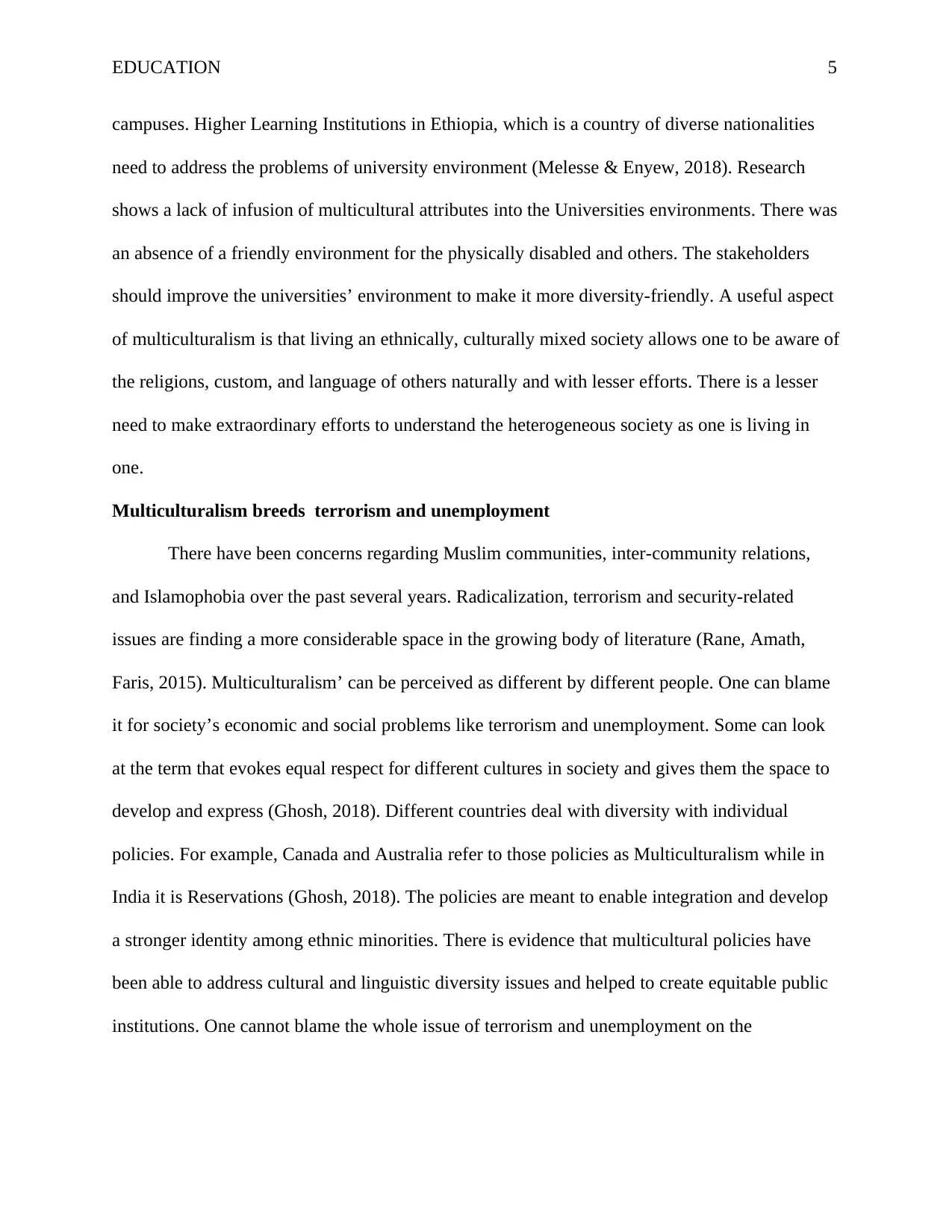
EDUCATION 5
campuses. Higher Learning Institutions in Ethiopia, which is a country of diverse nationalities
need to address the problems of university environment (Melesse & Enyew, 2018). Research
shows a lack of infusion of multicultural attributes into the Universities environments. There was
an absence of a friendly environment for the physically disabled and others. The stakeholders
should improve the universities’ environment to make it more diversity-friendly. A useful aspect
of multiculturalism is that living an ethnically, culturally mixed society allows one to be aware of
the religions, custom, and language of others naturally and with lesser efforts. There is a lesser
need to make extraordinary efforts to understand the heterogeneous society as one is living in
one.
Multiculturalism breeds terrorism and unemployment
There have been concerns regarding Muslim communities, inter-community relations,
and Islamophobia over the past several years. Radicalization, terrorism and security-related
issues are finding a more considerable space in the growing body of literature (Rane, Amath,
Faris, 2015). Multiculturalism’ can be perceived as different by different people. One can blame
it for society’s economic and social problems like terrorism and unemployment. Some can look
at the term that evokes equal respect for different cultures in society and gives them the space to
develop and express (Ghosh, 2018). Different countries deal with diversity with individual
policies. For example, Canada and Australia refer to those policies as Multiculturalism while in
India it is Reservations (Ghosh, 2018). The policies are meant to enable integration and develop
a stronger identity among ethnic minorities. There is evidence that multicultural policies have
been able to address cultural and linguistic diversity issues and helped to create equitable public
institutions. One cannot blame the whole issue of terrorism and unemployment on the
campuses. Higher Learning Institutions in Ethiopia, which is a country of diverse nationalities
need to address the problems of university environment (Melesse & Enyew, 2018). Research
shows a lack of infusion of multicultural attributes into the Universities environments. There was
an absence of a friendly environment for the physically disabled and others. The stakeholders
should improve the universities’ environment to make it more diversity-friendly. A useful aspect
of multiculturalism is that living an ethnically, culturally mixed society allows one to be aware of
the religions, custom, and language of others naturally and with lesser efforts. There is a lesser
need to make extraordinary efforts to understand the heterogeneous society as one is living in
one.
Multiculturalism breeds terrorism and unemployment
There have been concerns regarding Muslim communities, inter-community relations,
and Islamophobia over the past several years. Radicalization, terrorism and security-related
issues are finding a more considerable space in the growing body of literature (Rane, Amath,
Faris, 2015). Multiculturalism’ can be perceived as different by different people. One can blame
it for society’s economic and social problems like terrorism and unemployment. Some can look
at the term that evokes equal respect for different cultures in society and gives them the space to
develop and express (Ghosh, 2018). Different countries deal with diversity with individual
policies. For example, Canada and Australia refer to those policies as Multiculturalism while in
India it is Reservations (Ghosh, 2018). The policies are meant to enable integration and develop
a stronger identity among ethnic minorities. There is evidence that multicultural policies have
been able to address cultural and linguistic diversity issues and helped to create equitable public
institutions. One cannot blame the whole issue of terrorism and unemployment on the
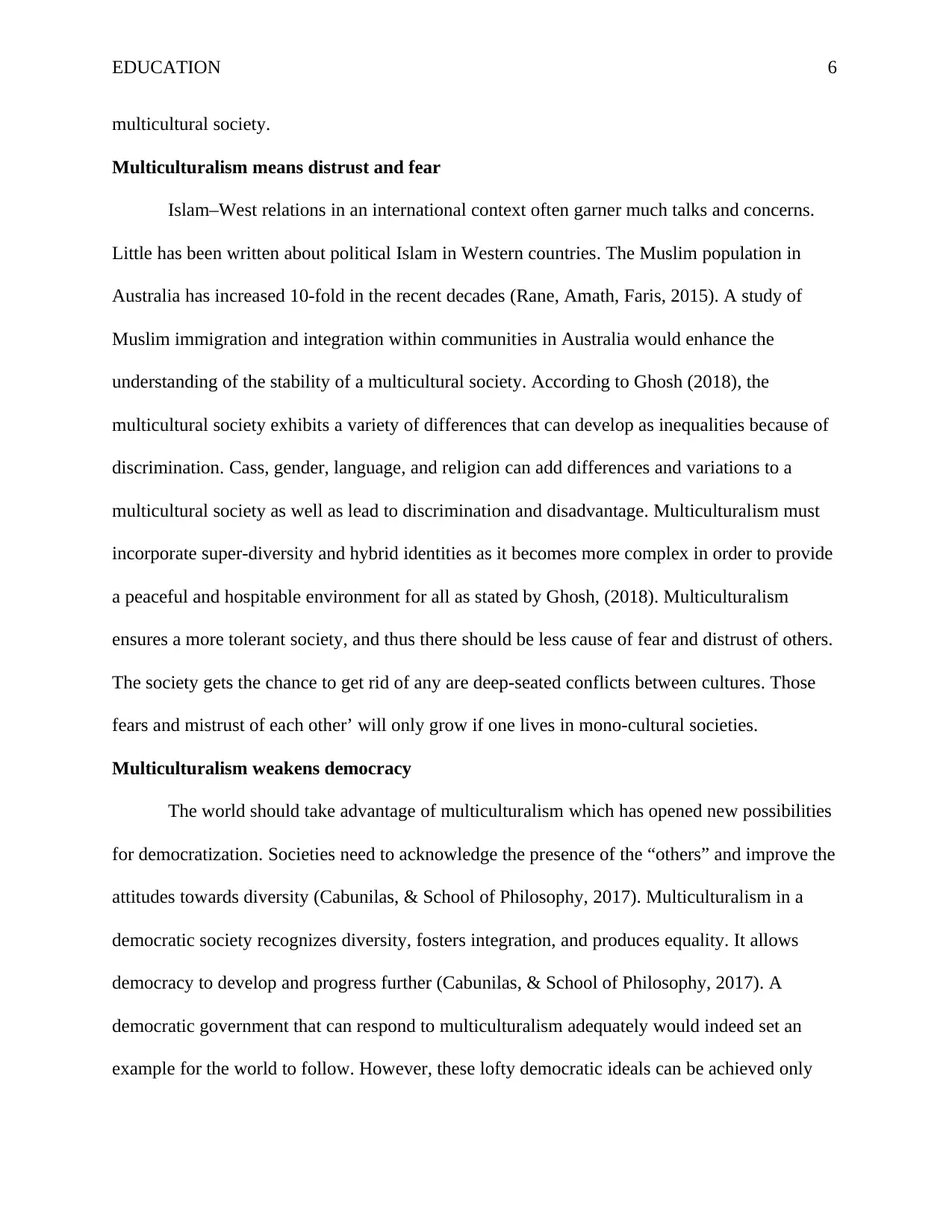
EDUCATION 6
multicultural society.
Multiculturalism means distrust and fear
Islam–West relations in an international context often garner much talks and concerns.
Little has been written about political Islam in Western countries. The Muslim population in
Australia has increased 10-fold in the recent decades (Rane, Amath, Faris, 2015). A study of
Muslim immigration and integration within communities in Australia would enhance the
understanding of the stability of a multicultural society. According to Ghosh (2018), the
multicultural society exhibits a variety of differences that can develop as inequalities because of
discrimination. Cass, gender, language, and religion can add differences and variations to a
multicultural society as well as lead to discrimination and disadvantage. Multiculturalism must
incorporate super-diversity and hybrid identities as it becomes more complex in order to provide
a peaceful and hospitable environment for all as stated by Ghosh, (2018). Multiculturalism
ensures a more tolerant society, and thus there should be less cause of fear and distrust of others.
The society gets the chance to get rid of any are deep-seated conflicts between cultures. Those
fears and mistrust of each other’ will only grow if one lives in mono-cultural societies.
Multiculturalism weakens democracy
The world should take advantage of multiculturalism which has opened new possibilities
for democratization. Societies need to acknowledge the presence of the “others” and improve the
attitudes towards diversity (Cabunilas, & School of Philosophy, 2017). Multiculturalism in a
democratic society recognizes diversity, fosters integration, and produces equality. It allows
democracy to develop and progress further (Cabunilas, & School of Philosophy, 2017). A
democratic government that can respond to multiculturalism adequately would indeed set an
example for the world to follow. However, these lofty democratic ideals can be achieved only
multicultural society.
Multiculturalism means distrust and fear
Islam–West relations in an international context often garner much talks and concerns.
Little has been written about political Islam in Western countries. The Muslim population in
Australia has increased 10-fold in the recent decades (Rane, Amath, Faris, 2015). A study of
Muslim immigration and integration within communities in Australia would enhance the
understanding of the stability of a multicultural society. According to Ghosh (2018), the
multicultural society exhibits a variety of differences that can develop as inequalities because of
discrimination. Cass, gender, language, and religion can add differences and variations to a
multicultural society as well as lead to discrimination and disadvantage. Multiculturalism must
incorporate super-diversity and hybrid identities as it becomes more complex in order to provide
a peaceful and hospitable environment for all as stated by Ghosh, (2018). Multiculturalism
ensures a more tolerant society, and thus there should be less cause of fear and distrust of others.
The society gets the chance to get rid of any are deep-seated conflicts between cultures. Those
fears and mistrust of each other’ will only grow if one lives in mono-cultural societies.
Multiculturalism weakens democracy
The world should take advantage of multiculturalism which has opened new possibilities
for democratization. Societies need to acknowledge the presence of the “others” and improve the
attitudes towards diversity (Cabunilas, & School of Philosophy, 2017). Multiculturalism in a
democratic society recognizes diversity, fosters integration, and produces equality. It allows
democracy to develop and progress further (Cabunilas, & School of Philosophy, 2017). A
democratic government that can respond to multiculturalism adequately would indeed set an
example for the world to follow. However, these lofty democratic ideals can be achieved only
⊘ This is a preview!⊘
Do you want full access?
Subscribe today to unlock all pages.

Trusted by 1+ million students worldwide
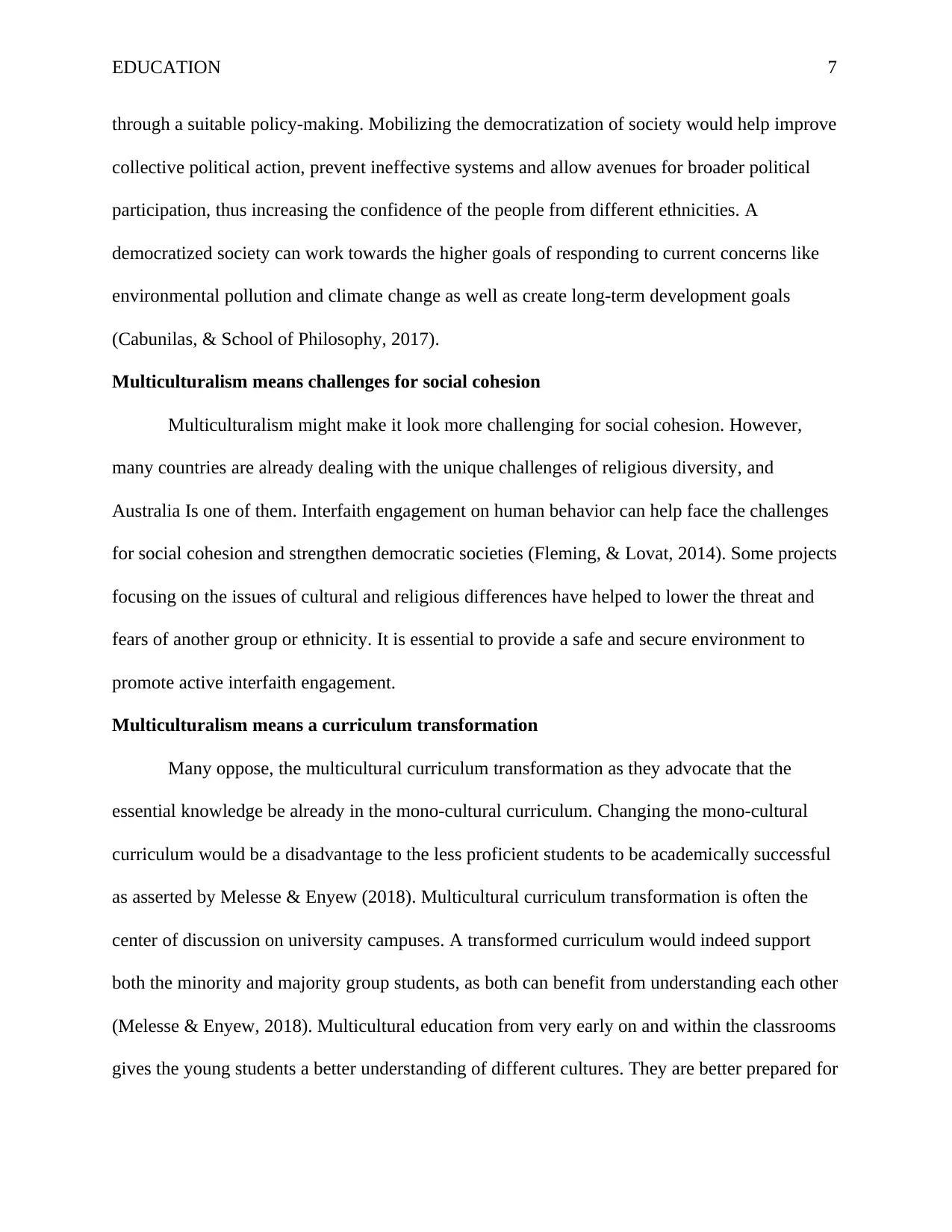
EDUCATION 7
through a suitable policy-making. Mobilizing the democratization of society would help improve
collective political action, prevent ineffective systems and allow avenues for broader political
participation, thus increasing the confidence of the people from different ethnicities. A
democratized society can work towards the higher goals of responding to current concerns like
environmental pollution and climate change as well as create long-term development goals
(Cabunilas, & School of Philosophy, 2017).
Multiculturalism means challenges for social cohesion
Multiculturalism might make it look more challenging for social cohesion. However,
many countries are already dealing with the unique challenges of religious diversity, and
Australia Is one of them. Interfaith engagement on human behavior can help face the challenges
for social cohesion and strengthen democratic societies (Fleming, & Lovat, 2014). Some projects
focusing on the issues of cultural and religious differences have helped to lower the threat and
fears of another group or ethnicity. It is essential to provide a safe and secure environment to
promote active interfaith engagement.
Multiculturalism means a curriculum transformation
Many oppose, the multicultural curriculum transformation as they advocate that the
essential knowledge be already in the mono-cultural curriculum. Changing the mono-cultural
curriculum would be a disadvantage to the less proficient students to be academically successful
as asserted by Melesse & Enyew (2018). Multicultural curriculum transformation is often the
center of discussion on university campuses. A transformed curriculum would indeed support
both the minority and majority group students, as both can benefit from understanding each other
(Melesse & Enyew, 2018). Multicultural education from very early on and within the classrooms
gives the young students a better understanding of different cultures. They are better prepared for
through a suitable policy-making. Mobilizing the democratization of society would help improve
collective political action, prevent ineffective systems and allow avenues for broader political
participation, thus increasing the confidence of the people from different ethnicities. A
democratized society can work towards the higher goals of responding to current concerns like
environmental pollution and climate change as well as create long-term development goals
(Cabunilas, & School of Philosophy, 2017).
Multiculturalism means challenges for social cohesion
Multiculturalism might make it look more challenging for social cohesion. However,
many countries are already dealing with the unique challenges of religious diversity, and
Australia Is one of them. Interfaith engagement on human behavior can help face the challenges
for social cohesion and strengthen democratic societies (Fleming, & Lovat, 2014). Some projects
focusing on the issues of cultural and religious differences have helped to lower the threat and
fears of another group or ethnicity. It is essential to provide a safe and secure environment to
promote active interfaith engagement.
Multiculturalism means a curriculum transformation
Many oppose, the multicultural curriculum transformation as they advocate that the
essential knowledge be already in the mono-cultural curriculum. Changing the mono-cultural
curriculum would be a disadvantage to the less proficient students to be academically successful
as asserted by Melesse & Enyew (2018). Multicultural curriculum transformation is often the
center of discussion on university campuses. A transformed curriculum would indeed support
both the minority and majority group students, as both can benefit from understanding each other
(Melesse & Enyew, 2018). Multicultural education from very early on and within the classrooms
gives the young students a better understanding of different cultures. They are better prepared for
Paraphrase This Document
Need a fresh take? Get an instant paraphrase of this document with our AI Paraphraser
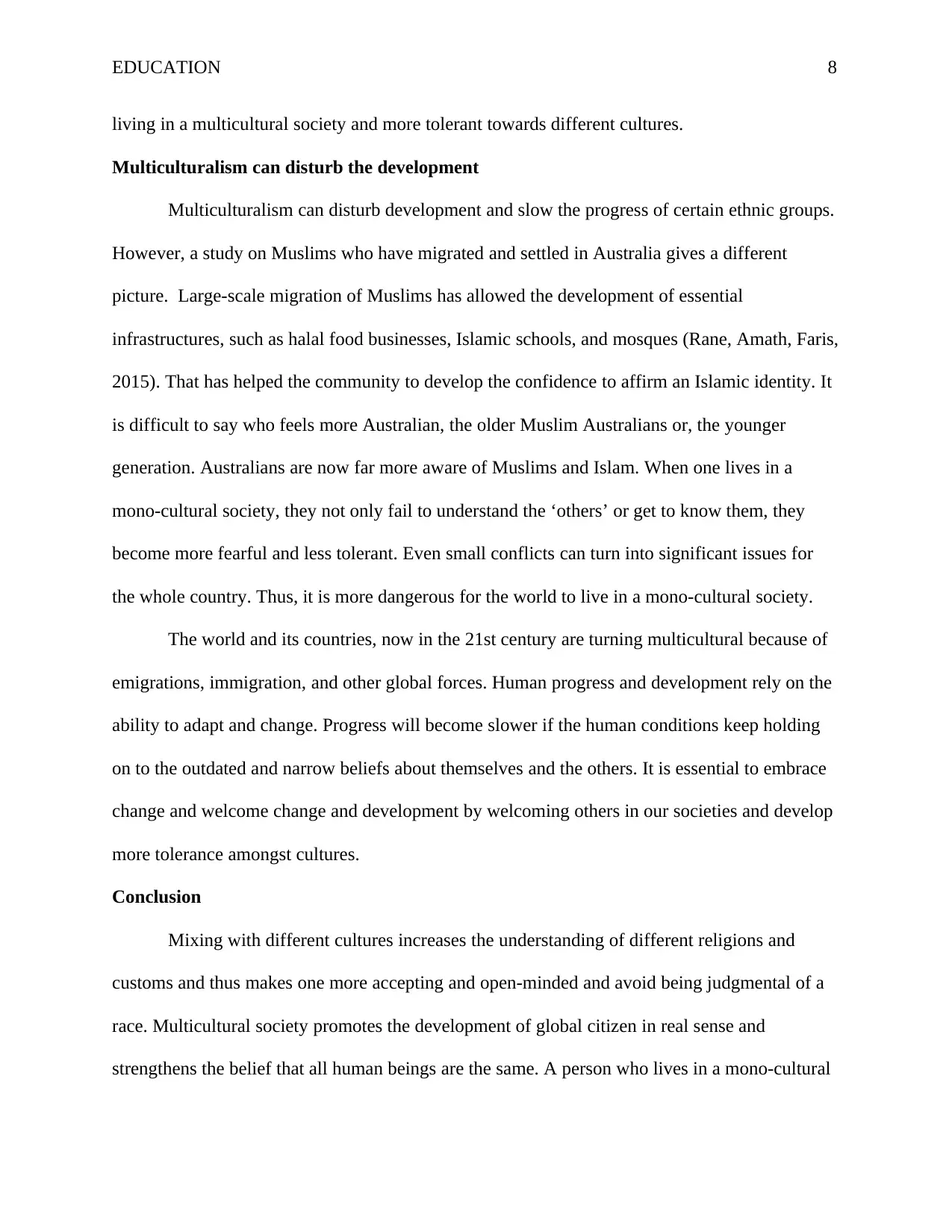
EDUCATION 8
living in a multicultural society and more tolerant towards different cultures.
Multiculturalism can disturb the development
Multiculturalism can disturb development and slow the progress of certain ethnic groups.
However, a study on Muslims who have migrated and settled in Australia gives a different
picture. Large-scale migration of Muslims has allowed the development of essential
infrastructures, such as halal food businesses, Islamic schools, and mosques (Rane, Amath, Faris,
2015). That has helped the community to develop the confidence to affirm an Islamic identity. It
is difficult to say who feels more Australian, the older Muslim Australians or, the younger
generation. Australians are now far more aware of Muslims and Islam. When one lives in a
mono-cultural society, they not only fail to understand the ‘others’ or get to know them, they
become more fearful and less tolerant. Even small conflicts can turn into significant issues for
the whole country. Thus, it is more dangerous for the world to live in a mono-cultural society.
The world and its countries, now in the 21st century are turning multicultural because of
emigrations, immigration, and other global forces. Human progress and development rely on the
ability to adapt and change. Progress will become slower if the human conditions keep holding
on to the outdated and narrow beliefs about themselves and the others. It is essential to embrace
change and welcome change and development by welcoming others in our societies and develop
more tolerance amongst cultures.
Conclusion
Mixing with different cultures increases the understanding of different religions and
customs and thus makes one more accepting and open-minded and avoid being judgmental of a
race. Multicultural society promotes the development of global citizen in real sense and
strengthens the belief that all human beings are the same. A person who lives in a mono-cultural
living in a multicultural society and more tolerant towards different cultures.
Multiculturalism can disturb the development
Multiculturalism can disturb development and slow the progress of certain ethnic groups.
However, a study on Muslims who have migrated and settled in Australia gives a different
picture. Large-scale migration of Muslims has allowed the development of essential
infrastructures, such as halal food businesses, Islamic schools, and mosques (Rane, Amath, Faris,
2015). That has helped the community to develop the confidence to affirm an Islamic identity. It
is difficult to say who feels more Australian, the older Muslim Australians or, the younger
generation. Australians are now far more aware of Muslims and Islam. When one lives in a
mono-cultural society, they not only fail to understand the ‘others’ or get to know them, they
become more fearful and less tolerant. Even small conflicts can turn into significant issues for
the whole country. Thus, it is more dangerous for the world to live in a mono-cultural society.
The world and its countries, now in the 21st century are turning multicultural because of
emigrations, immigration, and other global forces. Human progress and development rely on the
ability to adapt and change. Progress will become slower if the human conditions keep holding
on to the outdated and narrow beliefs about themselves and the others. It is essential to embrace
change and welcome change and development by welcoming others in our societies and develop
more tolerance amongst cultures.
Conclusion
Mixing with different cultures increases the understanding of different religions and
customs and thus makes one more accepting and open-minded and avoid being judgmental of a
race. Multicultural society promotes the development of global citizen in real sense and
strengthens the belief that all human beings are the same. A person who lives in a mono-cultural
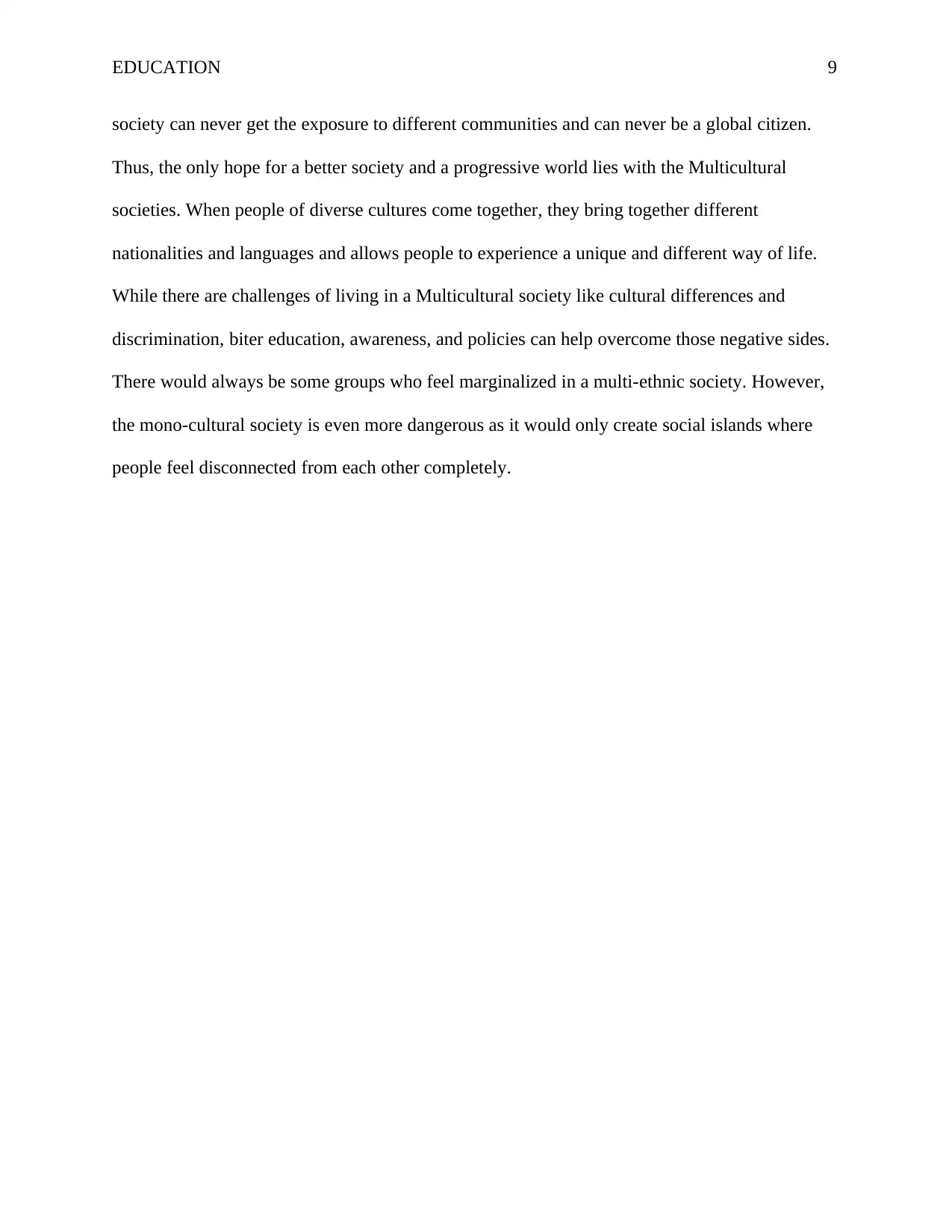
EDUCATION 9
society can never get the exposure to different communities and can never be a global citizen.
Thus, the only hope for a better society and a progressive world lies with the Multicultural
societies. When people of diverse cultures come together, they bring together different
nationalities and languages and allows people to experience a unique and different way of life.
While there are challenges of living in a Multicultural society like cultural differences and
discrimination, biter education, awareness, and policies can help overcome those negative sides.
There would always be some groups who feel marginalized in a multi-ethnic society. However,
the mono-cultural society is even more dangerous as it would only create social islands where
people feel disconnected from each other completely.
society can never get the exposure to different communities and can never be a global citizen.
Thus, the only hope for a better society and a progressive world lies with the Multicultural
societies. When people of diverse cultures come together, they bring together different
nationalities and languages and allows people to experience a unique and different way of life.
While there are challenges of living in a Multicultural society like cultural differences and
discrimination, biter education, awareness, and policies can help overcome those negative sides.
There would always be some groups who feel marginalized in a multi-ethnic society. However,
the mono-cultural society is even more dangerous as it would only create social islands where
people feel disconnected from each other completely.
⊘ This is a preview!⊘
Do you want full access?
Subscribe today to unlock all pages.

Trusted by 1+ million students worldwide
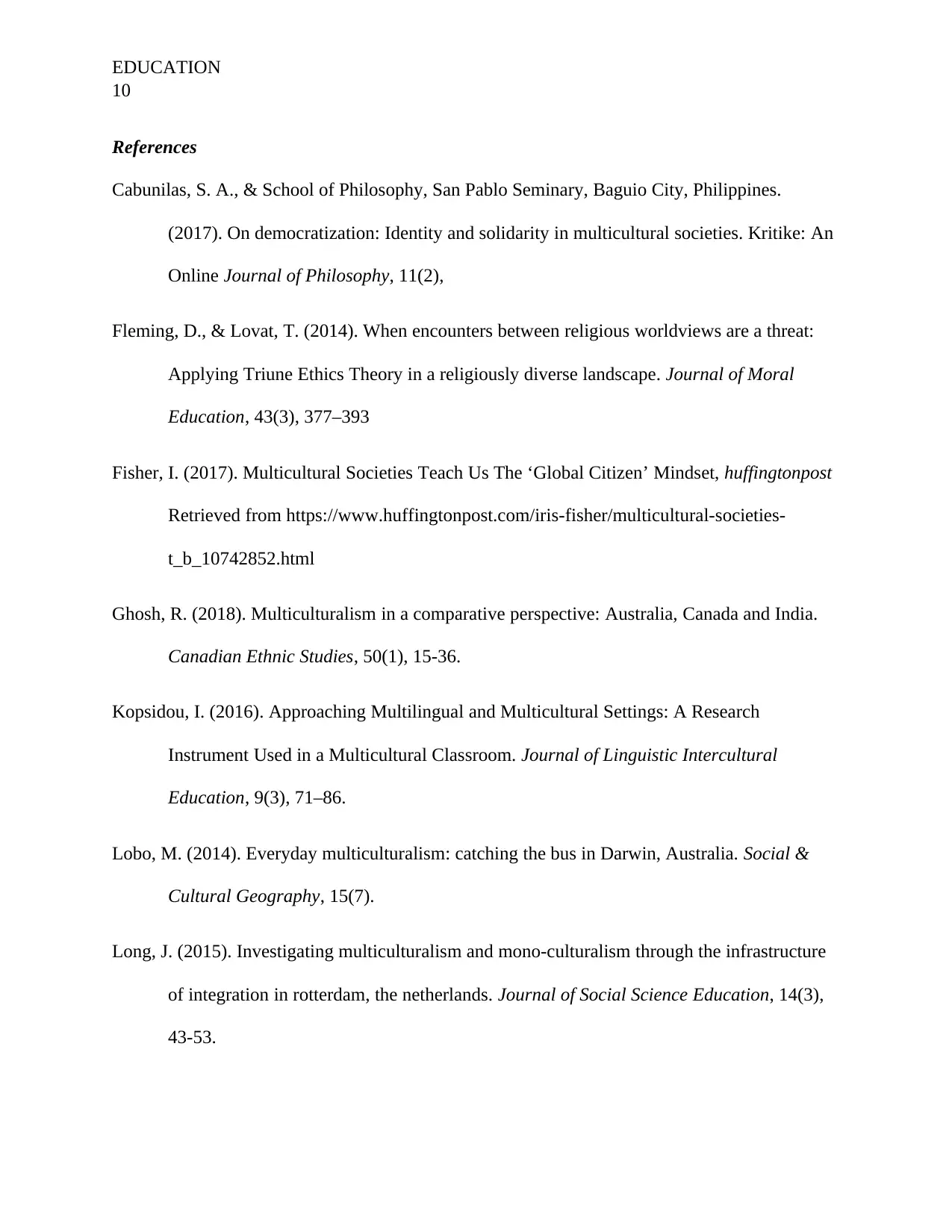
EDUCATION
10
References
Cabunilas, S. A., & School of Philosophy, San Pablo Seminary, Baguio City, Philippines.
(2017). On democratization: Identity and solidarity in multicultural societies. Kritike: An
Online Journal of Philosophy, 11(2),
Fleming, D., & Lovat, T. (2014). When encounters between religious worldviews are a threat:
Applying Triune Ethics Theory in a religiously diverse landscape. Journal of Moral
Education, 43(3), 377–393
Fisher, I. (2017). Multicultural Societies Teach Us The ‘Global Citizen’ Mindset, huffingtonpost
Retrieved from https://www.huffingtonpost.com/iris-fisher/multicultural-societies-
t_b_10742852.html
Ghosh, R. (2018). Multiculturalism in a comparative perspective: Australia, Canada and India.
Canadian Ethnic Studies, 50(1), 15-36.
Kopsidou, I. (2016). Approaching Multilingual and Multicultural Settings: A Research
Instrument Used in a Multicultural Classroom. Journal of Linguistic Intercultural
Education, 9(3), 71–86.
Lobo, M. (2014). Everyday multiculturalism: catching the bus in Darwin, Australia. Social &
Cultural Geography, 15(7).
Long, J. (2015). Investigating multiculturalism and mono-culturalism through the infrastructure
of integration in rotterdam, the netherlands. Journal of Social Science Education, 14(3),
43-53.
10
References
Cabunilas, S. A., & School of Philosophy, San Pablo Seminary, Baguio City, Philippines.
(2017). On democratization: Identity and solidarity in multicultural societies. Kritike: An
Online Journal of Philosophy, 11(2),
Fleming, D., & Lovat, T. (2014). When encounters between religious worldviews are a threat:
Applying Triune Ethics Theory in a religiously diverse landscape. Journal of Moral
Education, 43(3), 377–393
Fisher, I. (2017). Multicultural Societies Teach Us The ‘Global Citizen’ Mindset, huffingtonpost
Retrieved from https://www.huffingtonpost.com/iris-fisher/multicultural-societies-
t_b_10742852.html
Ghosh, R. (2018). Multiculturalism in a comparative perspective: Australia, Canada and India.
Canadian Ethnic Studies, 50(1), 15-36.
Kopsidou, I. (2016). Approaching Multilingual and Multicultural Settings: A Research
Instrument Used in a Multicultural Classroom. Journal of Linguistic Intercultural
Education, 9(3), 71–86.
Lobo, M. (2014). Everyday multiculturalism: catching the bus in Darwin, Australia. Social &
Cultural Geography, 15(7).
Long, J. (2015). Investigating multiculturalism and mono-culturalism through the infrastructure
of integration in rotterdam, the netherlands. Journal of Social Science Education, 14(3),
43-53.
Paraphrase This Document
Need a fresh take? Get an instant paraphrase of this document with our AI Paraphraser
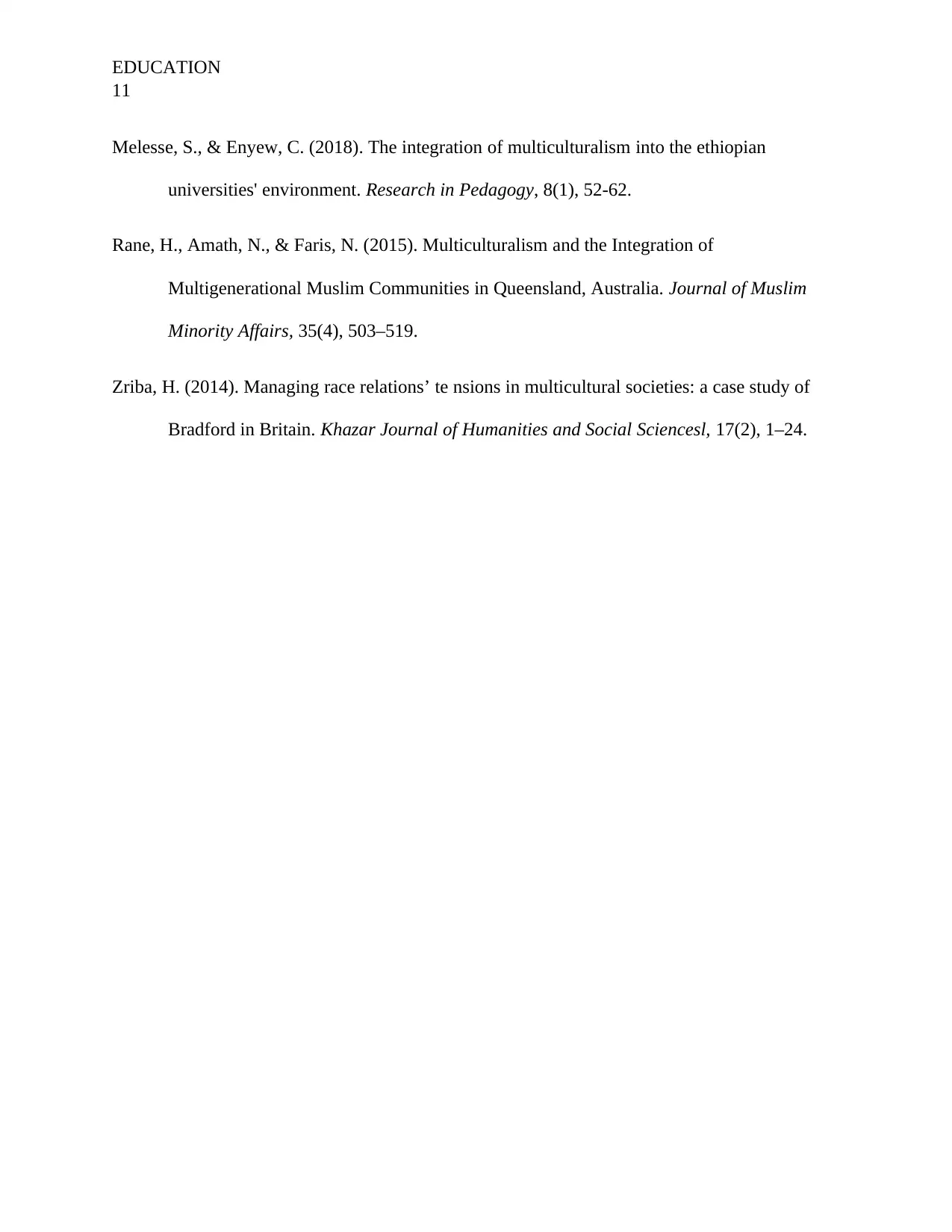
EDUCATION
11
Melesse, S., & Enyew, C. (2018). The integration of multiculturalism into the ethiopian
universities' environment. Research in Pedagogy, 8(1), 52-62.
Rane, H., Amath, N., & Faris, N. (2015). Multiculturalism and the Integration of
Multigenerational Muslim Communities in Queensland, Australia. Journal of Muslim
Minority Affairs, 35(4), 503–519.
Zriba, H. (2014). Managing race relations’ te nsions in multicultural societies: a case study of
Bradford in Britain. Khazar Journal of Humanities and Social Sciencesl, 17(2), 1–24.
11
Melesse, S., & Enyew, C. (2018). The integration of multiculturalism into the ethiopian
universities' environment. Research in Pedagogy, 8(1), 52-62.
Rane, H., Amath, N., & Faris, N. (2015). Multiculturalism and the Integration of
Multigenerational Muslim Communities in Queensland, Australia. Journal of Muslim
Minority Affairs, 35(4), 503–519.
Zriba, H. (2014). Managing race relations’ te nsions in multicultural societies: a case study of
Bradford in Britain. Khazar Journal of Humanities and Social Sciencesl, 17(2), 1–24.
1 out of 11
Related Documents
Your All-in-One AI-Powered Toolkit for Academic Success.
+13062052269
info@desklib.com
Available 24*7 on WhatsApp / Email
![[object Object]](/_next/static/media/star-bottom.7253800d.svg)
Unlock your academic potential
Copyright © 2020–2025 A2Z Services. All Rights Reserved. Developed and managed by ZUCOL.





